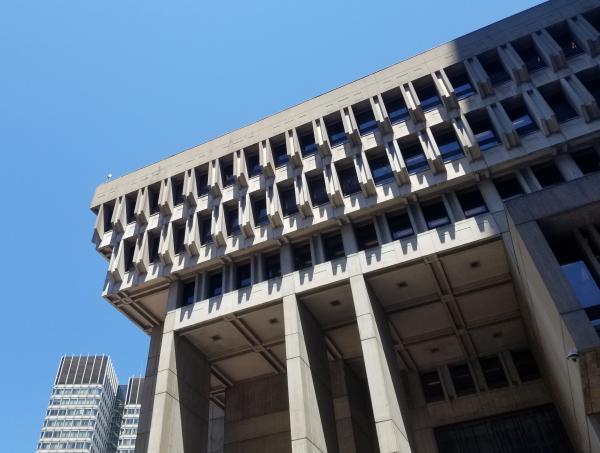January 4, 2022

Boston City Hall (Gintautas Dumcius photo)
After a year with three mayors amid an ongoing pandemic, Bostonians can’t be blamed for wanting things to settle down a bit. But anybody who’s made it to any Friday thinking, “Well, maybe next week will be quieter,” understands that’s a hope and prediction unlikely to come true.
The race for governor is expected to thrum in the background for the first half of the year, as Democrats, already in possession of a legislative supermajority, hope to retake the corner office held by Republican Charlie Baker for two terms. There will be plenty of intraparty battles among Democrats, as well as Republicans, some of whom remain in the tight thrall of a former president.
The race is already having ripple effects throughout the local political scene. State Sen. Sonia Chang-Diaz’s decision to run for governor spurred two House lawmakers who’ve represented parts of Dorchester (Liz Miranda and Nika Elugardo) to gear up runs for her Senate seat. That means there’ll be at least two House vacancies in Boston, offering a chance for more local activists and community organizers to throw their hats into the ring.
Whoever’s in the governor’s chair come next January will play a big role in determining what happens to Mayor Michelle Wu’s first term agenda, which includes a fare-free MBTA and rent control, two items that were part of her campaign platform.
Before announcing his decision to stick to two terms, Baker kept the door ajar for Wu’s proposals as he sought a non-aggression pact with Boston’s new chief executive. Wu has already hit the road with plans for three fare-free bus routes that run through Dorchester, Mattapan, and Roxbury, but whether she makes more headway with rent control than the late Mayor Thomas Menino, who also proposed its return, remains to be seen.
Meanwhile, Democrats running for governor will be seeking Wu’s endorsement while taking pages from her playbook. Her 2021 win – with an overwhelming 64 percent mandate from the city’s voters – came three years after Ayanna Pressley knocked out fellow Democrat Michael Capuano and a year after US Sen. Ed Markey fended off a challenge from an ambitious young member of the Kennedy family, as redundant as some of those adjectives may be. These results portend a shift in the electorate, at least in Boston, with voters in the latest election seeking a more liberal candidate who proposes an overhaul of how we take public transit and how much we spend to live here.
Here’s what else to watch for in the coming months.
New police commissioner.
The Boston Police Department was thrown into turmoil last year after Acting Mayor Kim Janey fired Commissioner Dennis White after the Boston Globe revealed a troubling personnel record overlooked by the Walsh administration. Separately, a former police union official was accused of molesting children, while other cops have been charged with overtime fraud. Wu, like some of her predecessors, is likely to run into resistance from public safety unions, which have typically resisted reforms, preferred praise, and disdained outsiders while turning contract fights into nasty affairs.
The schools.
The Boston Public Schools system has its own multitude of problems, the most recent happening this week when more than 1,000 staffers, nearly half of them teachers, stayed away on Tuesday, in part due to the coronavirus pandemic. Violent incidents, such as the ninth grader who on Nov. 3 allegedly attacked the head of Dorchester’s Henderson K-12 School, have also drawn scrutiny from advocates and city councillors.
In the background, there’s the steadily declining percentage of school-age children among Boston’s population as parents seek other options.
Next steps for Long Island.
On Tuesday, Wu and her team lit out for Long Island, taking a 10-minute ferry ride to what was once home to many of the city’s addiction and recovery offerings. The bridge to Long Island abruptly came down under Mayor Marty Walsh, who cited its dilapidated structure. But the city has been locked in a legal battle ever since with neighboring Quincy, whose residents have resisted rebuilding the bridge that starts on Quincy land.
In a press conference after her team’s return to the mainland, Wu said the amount of space that remains available on Long Island – 400,000 gross square feet of buildings – widened the eyes of her housing chief, Sheila Dillon. “There is a very powerful potential for recovery, and for those who need access to services to continue that legacy on the island,” Wu, who pushed for a focus on ferry service during the campaign, told reporters.
There isn’t yet a timeline for when an island facility could be back up and running, as city officials focus on creating temporary housing to deal with the addiction and homelessness crisis at Massachusetts Avenue and Melnea Cass Boulevard.
The end of the Boston Planning and Development Agency.
Mayoral candidates often run against the city’s planning and development agency, including Marty Walsh and, when he ran against Mayor Menino in 2009, City Councillor At-Large Michael Flaherty. Under Walsh, the agency underwent a rebrand while still technically carrying the name Boston Redevelopment Authority. Wu has been adamant about abolishing the agency and hiring a chief of planning, who will be tasked with streamlining the whole process and making it more transparent. The development pipeline is expected to continue as the abolishment slowly gets underway.
Speculation about the future of development in Boston, and who will be one of the key figures behind it, is a focus of the city’s real estate industry.
“It’s like waiting for a pope to be chosen,” one insider recently told the Boston Business Journal.
Topics:


